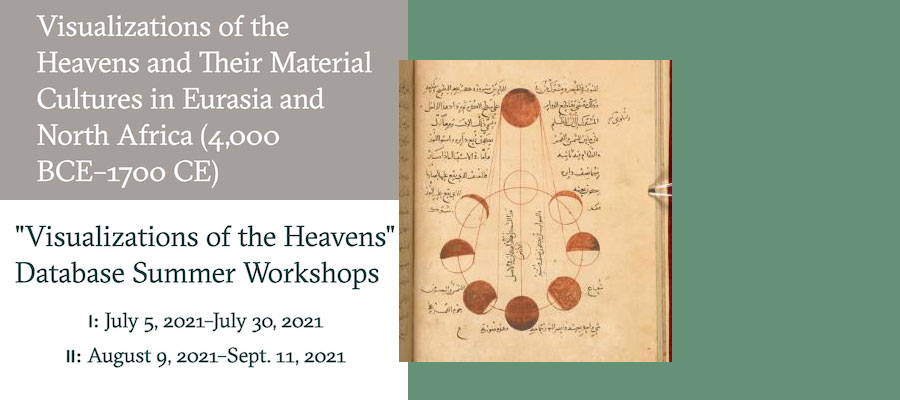Visualizations of the Heavens Database Summer Workshops, Max Planck Institute for the History of Science Online, July 5–30, 2021 & August 9–September 11, 2021
The Max Planck Institute for the History of Science, Berlin (MPIWG) Dept. III is seeking several participants for two workshops of four weeks each. Selected participants will support the extension of a protected image database developed in the framework of the Working Group Visualizations of the Heavens (4000 BCE–1700 CE). Due to the pandemic, remote participation in the workshops will be the default.
The Working Group focuses on visual representations and material objects in the creation, change, and movement of astral knowledge across space and time. During the workshops, participants will be trained to use and further populate the Working Group’s protected image database, which serves as the main tool to digitally assemble diverse forms of astro-related imagery from almost 6,000 years of Eurasian history. Workshop participants will thus have the opportunity to substantially contribute to and get insight into a collaborative research project in the history of science with a strong digital humanities component and they will be acquainted with manifold and often rare sources. Successful workshop participation will be certified, and participants will receive an honorarium of 15€ per hour (pending administrative approval).
Each workshop will start with a one-day introduction and training. Afterwards, participants will start uploading images and metadata to the image database and execute related tasks including, but not limited to:
- collecting material by systematically researching online collections and books
- scanning books and preparing images for upload
- uploading the collected visual material and its metadata to the database
- participating in instruction sessions and quality control
Native English speakers or others with a good command of English are encouraged to apply. Reading ability in at least one of the following languages is required: modern European, East or South Asian, Middle Eastern, classical Greek, Latin, Arabic, Chinese, Japanese, Korean, Middle Persian, Sanskrit, Tamil, Akkadian, Babylonian, Egyptian. Applicants must at least hold a Bachelor’s degree, preferably in either art history, history of science, intellectual or regional history, museum or library studies, computer science or related disciplines. They should have a good working knowledge of modern information technology; skills in (visual) databases or digital humanities are considered an advantage.
Selected participants should commit to participating in the entire four-week-long workshop, and they will receive an honorarium after review of materials based on actual hours participated.
